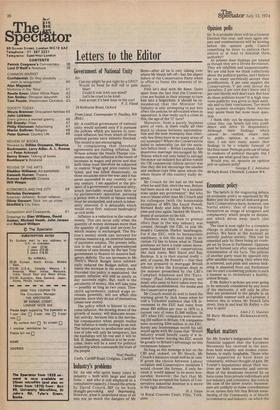Industry's problems
Sir: As one who spent many years in industry — both with large and small firms — and who is still employed in a consultative capacity, 1 found the article by David Crouch MP to be both thought-provoking and depressing. However, what it underlined most of all was not so much the dangers of Mr Benn—after all he is only Caking over where Mr Heath left off—but the abject failure of the Conservative Party when in office to foster the interests of industry.
First let's deal with Mr Benn. Quite apart from the fact that the Conservatives are foolish in their attempt to turn him into a bogeyman, it should be remembered that the Minister for Industry is only attempting to put into effect the policies he advocated when in opposition. Is that really such a crime in this, the age of the turn?
Moreover, from a purely business point of view, is there really all that much to choose between nationalisation and the near monopoly that relatively few firms have in so many areas of our economy? Where the Conservatives failed so lamentably (as did the socialists before them — British Leyland, that disastrous marriage encouraged by Mr Wilson which not only failed to salvage the motor car industry but all but ruined the UK commercial vehicle sector) was that they did not encourage the smaller and medium-type firm upon whom the whole future of this country really depends.
Mr Crouch hit the nail on the head when he said that, since the war, Britain had been stuck on a road "to a socialist state under any government". But who was to blame other than Mr Crouch and his colleagues (with the honourable exceptions of MPs like Enoch Powell, Richard Body and John Biffen) who, time and time again, backed Mr Heath's brand of socialism to the hilt.
Nowhere was this seen to greater effect than in the way industry was conned, through the CBI, to join Mr Heath's Common Market bandwagon. For if the EEC, with its bureaucratic machinery, is not the next step to socialism I'd like to know what is. Thank goodness we have a trade union movement headed by small 'c' conservatives like Jack Jones, Bert Hazel and Ray Buckton. It is to their eternal credit — and, of course, Mr Powell's — that they are not prepared to mortgage British industry down the European drain in the manner prescribed by the CBI's Campbell Adamson and the 'Eurocreeps' (Paul Johnson's phrase, not mine) who seem to have taken over the industrial establishment, the media and the Conservative party.
Mr Crouch would do well to heed the warning given by Jack Jones when he told a Yorkshire audience that UK investment in the EEC had risen from about £83 million per year in 1970 to a current rate of some £1,500 million. In 1971 when EEC companies were investing £33 million in Britain, UK companies were investing £244 million in the EEC. Surely any businessman worth his salt would agree with Mr Jones that "British industry would benefit vastly if it invested at home; leaving the EEC would be greatly to Britain's advantage on this investment balance."
So long as this message is lost on the CBI and, indeed, on Mr Heath, Mr Crouch's initiative could well be in vain. If given the choice between Labour socialism and Conservative socialism I would choose the former, if only because it would appear to be more honourable. However, the fact that Mr Crouch has accepted the failure of Conservative industrial doctrine is a move in the right direction.
H. J. Yates 14 Royal Crescent Court, Filey, Yorkshire


































 Previous page
Previous page